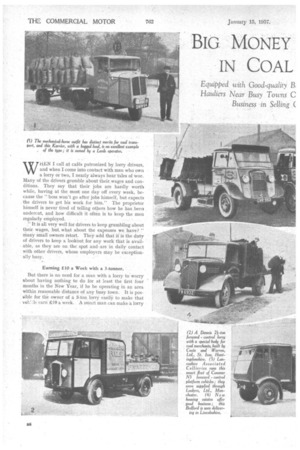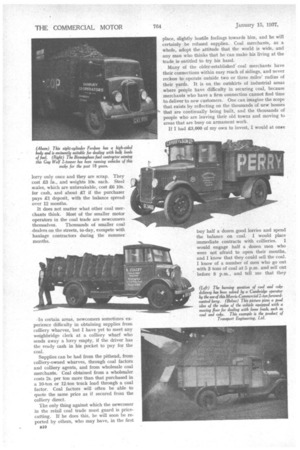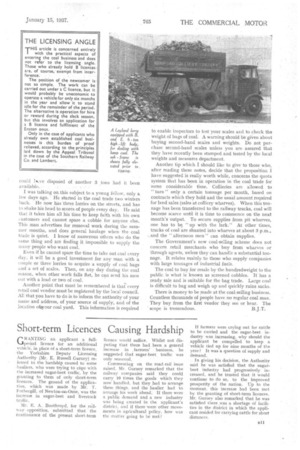BIG MONEY
Page 42

Page 43

Page 44

Page 45

If you've noticed an error in this article please click here to report it so we can fix it.
BE MADE
IN COAL AWKING
Equipped with Good-quality B, Hauliers Near Busy Towns C Business in Selling (
Set of Scales and Weights, ild Up Profitable Spare. time 0171 Door to Door WEN I call at cafes patronized by lorry drivers, and when I come into contact with men who own a lorry or two, I nearly always hear tales of woe. Many of the drivers grumble about their, wages and conditions. They say that their jobs are hardly worth while, having at the most one day off every week, because the "boss won't go after jobs himself, but expects
the drivers to get his work for him." The proprietor I himself is never tired of telling others how he has, been undercut, and how difficult it often is to keep the men regularly employed. . •
" It is all very well for drivers to keep grumbling about their wages, but, what about the expenses we have?" Many small owners retort. They add that it is the duty of drivers to keep a lookout for any work that is available, as they are on the spot and, are in daily contact with other drivers, whose employers may be exception
ally busy.
Earning £10 a Week with a 3-tonner.
But there is no need for a man with a lorry to worry about having nothing to do for at least the first four months in the New Year, if he be operating in an area within reasonable distance of any busy town. It is posible for the owner of a 3-ton, lorry easily to make that . vel-.1/21e earn £10 a week. A smart man can make a lorry
earn that sum by transferring to particular work after luncheon and continuing unfit about 7 p.m, Get 60 coal bags, a set of scales and weights, take the lorry to the nearest coal wharf and load up. Then drive out to any of the new building estates and shout, " Any coal I " You will be surprised at the ease with which the coal can be sold, and at a profit of 8d. per cwt.
I can imagine a small owner saying : " Look at the outlay, for a start? What will 60 coal bags cost? What will a set of scales and weights cost? Whalwill other coal merchants say and think? Will the collieries allow me to have coal for resale at trade terms? Is it possible for a man to go out and sell 3 tons of coal in the afternoon?"
The Usserttials and What They Cost.
Let me answer these questions. Coal bags are made in various sizes and weights, ranging in price from 3s. 9d. to Ss. 3d. Good-quality sacks that will last, with care, for three winters—it is advisable to purchase strong ones bearing the owner's initials—cost about 4s. 9d. each. One can pay a third of the cost on delivery and the balance in three or six months.
Scales and weights can be had on hire-purchase terms. There are two types of weighing machine. Those made of cast iron are cheaper, but they have to fall off the lorry only once and they are scrap. They cost 23 5s., and weights 10s. each. Steel scales, which are unbreakable, cost 26 10s, for cash, and about £7 if the purchaser pays 21 deposit, with the balance spread over 12 months.
It does not matter what other coal merchants think. Most of the smaller motor operators in the coal trade are newcomers themselves. Thousands of smaller coal • dealers on the streets, to-day, compete with haulage contractors during the summer months.
-In certain areas, newcomers sometimes experience difficulty in obtaining supplies from colliery wharves, but I have yet to meet any weighbridge clerk at a colliery wharf who sends away a lorry empty, if the driver has the ready cash in his pocket to pay for the coal.
Supplies can be had from the pithead, from colliery-owned wharves, through coal factors and colliery agents, and from wholesale coal merchants. Coal obtained from a wholesaler costs 2s. per ton snore than that purchased in a 10-ton or 12-ton truck load through a coal factor. Coal factors will often be able to quote the same price as if secured from the colliery direct.
The only thing against which the newcomer in the retail coal trade must guard is pricecutting. If he does this, he will soon be reported by others, who may have, in the first
BlO
place, slightly hostile feelings towards him, and he will certainly be refused supplies. Coal merchants, as a whole, adopt the attitude that the world is wide, and any man who thinks that he can make his living at the trade is entitled to try his hand.
Many of the older-established' coal merchants have their connections within easy reach of sidings, and never reckon to operate outside two or three miles' radius of their yards. It is on the outskirts of industrial areas where people have difficulty in securing coal, because merchants who have a firm connection cannot find time to deliver to new customers. One can imagine the scope that exists by reflecting on the thousands of new houses that are continually being built, and the thousands of people who are leaving their old towns and moving to areas that are busy on armament work.
If I had 23,000 of my own to invest, I would at onote buy half a dozen good lorries and spend the balance on coal. I would place
immediate contracts with collieries. I would engage half a .dozen men who were not afraid to open their mouths, and I know that they could sell the coal. I know of a number of men who go out with 3 tons of coal at 5 p.m. and sell out before 8 p.m., and tell me that they
could 1 u.ve dispoSed Of another 3 tons had it been available.
I was talking on this subject to a young fellow, only a few days ago. He started in the coal trade two winters hack. He now has three lorries on the streets, and has to shake his head to scores of people every day. lie said that it takes him all his time to keep faith with his own customers and cannot spare a cobble for anyone else. This man advertises for removal work during the summer months, and does general haulage when the coal trade is quiet. I know of numerous others who do the same thing and are finding it impossible to supply the many people who want coal.
Even if he cannot spare the time to take out coal every day, it will be a good investment for any man with a couple or three lorries to acquire a supply of coal bags and a set of scales. Then, on any day during the coal season, when other work falls flat, he can send his men out with a load or two of coal.
Another point that must be remembered is that' every retail coal vendor must be registered by the local council. All that you have to do is to inform the authority of your name and address, of your source of supply, and of the location oloyour coal yard. This information is required to enable inspectors to test your scales and to check the weight of bags of coal. A warning should be giVen about buying second-hand scales and weights. Do not purchase second-hand scales unless you are assured that they have recently been stamped and tested by the local weights and measures department.
Another tip which I should like to give to those who, after reading these notes, decide that the proposition I have suggested is really worth while, concerns the quota system that has been in operation in the coal trade for some considerable time. Collieries are allowed to " turn" only a certain tonnage per month, based on contracts which they hold and the usual amount required for land sales (sales at colliery wharves). When this tonnage has been transferred to the railway trucks, coal will become scarce until it is time to commence on the next month's output. To secure supplies from pit wharves, one has to bg "up with the lark." At other times, trucks of coal are shunted into wharves at about 3 p.m., and the " afternoon men" can obtain supplies.
The Government's new coal-selling scheme does not concern retail merchants who buy from wharves or through agents, unless they can handle a substantial tonnage. It relates mainly, to those who supply companies with large tonnages of industrial fuels.
The coal to buy for resale by the hundredweight to the public is what is known as screened cobbles. It has a ready sale and is suitable for the bag trade. Large coal is difficult to bag and weigh up and quickly ruins sacks.
There is money to be !made at the coal-selling business. Countless thousands of people have no regular coal man. They buy from the first vendor they see or hear. The scope is tremendous. B.J.T.




















































































